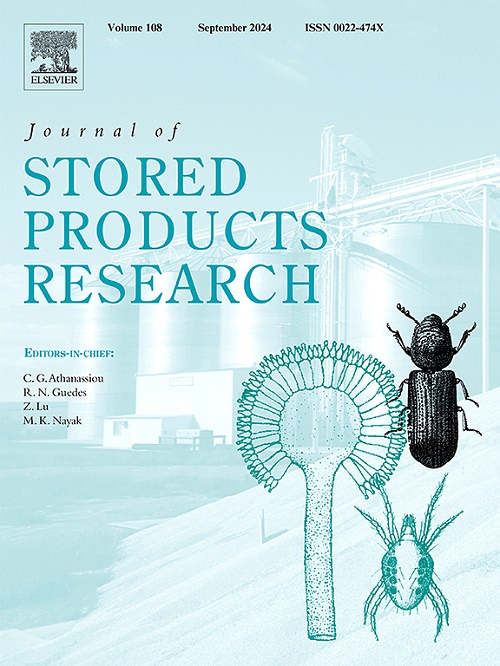Effective and Biosafe application of AITC-infused on cellulose strips as a fumigant for managing quality and major insect pests in stored chickpea grains
IF 2.7
2区 农林科学
Q1 ENTOMOLOGY
引用次数: 0
Abstract
The risks of synthetic insecticides have sparked growing interest in allelochemicals for stored product pest management. Allyl isothiocyanate (AITC), the key component of mustard essential oil, is effective against stored-product insect pests but has limitations due to its rapid evaporation, corrosiveness, and low spreadability. AITC scenario lacks its dose optimization, facile and economic method of its application against variety of insect-pests. Herein, AITC fumigant dose has been optimized against Callosobruchus chinensis L. (Coleoptera: Bruchidae) and Rhyzopertha dominica F. (Coleoptera: Bostrichidae) in chickpea grains by applying on a natural cellulose sponge with pore sizes ranging from 48 μm to 148 μm. Natural cellulose material revealed compatibility with the test chemical with even spread and appropriate fumigant toxicity. Mortality trends revealed more vulnerability of C. chinensis (LC99/24 = 58.96 μl) to AITC than R. dominica (LC99/48 = 142.30 μl). Oviposition deterrence (>90%) and complete inhibition of progeny emergence were achieved with a minimum dose of 40 μl AITC for C. chinensis and 120 μl for R. dominica. To preserve chickpea quality and manage C. chinensis and R. dominica 50 μl and 140 μl, respectively, of AITC was sufficient, ensuring complete economic benefit. This study highlighted AITC-infused cellulose strips as a natural, biodegradable, non-toxic, food-grade solution for controlling insect-pests of chickpea stored in LDPE packets.
求助全文
约1分钟内获得全文
求助全文
来源期刊
CiteScore
5.70
自引率
18.50%
发文量
112
审稿时长
45 days
期刊介绍:
The Journal of Stored Products Research provides an international medium for the publication of both reviews and original results from laboratory and field studies on the preservation and safety of stored products, notably food stocks, covering storage-related problems from the producer through the supply chain to the consumer. Stored products are characterised by having relatively low moisture content and include raw and semi-processed foods, animal feedstuffs, and a range of other durable items, including materials such as clothing or museum artefacts.

 求助内容:
求助内容: 应助结果提醒方式:
应助结果提醒方式:


